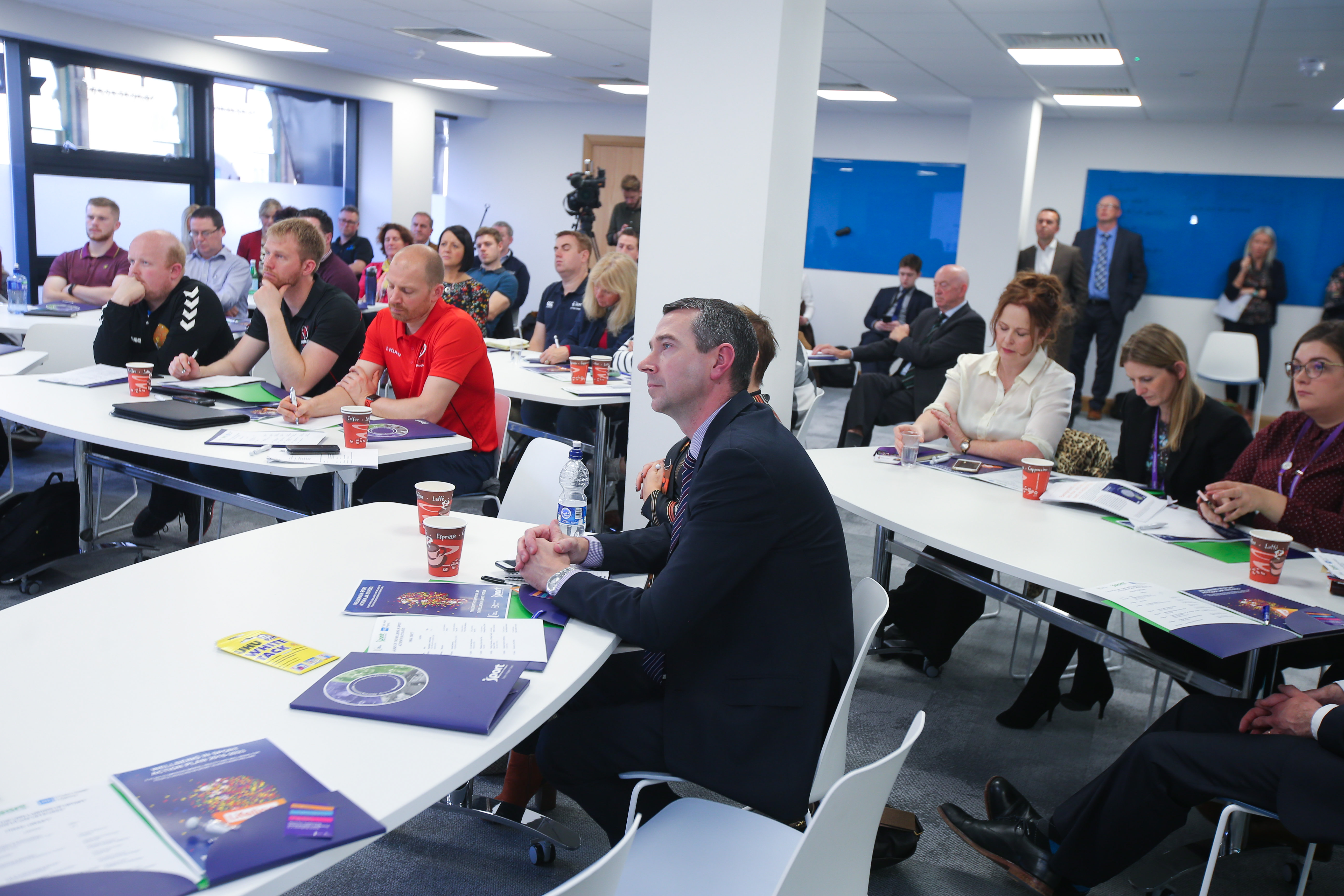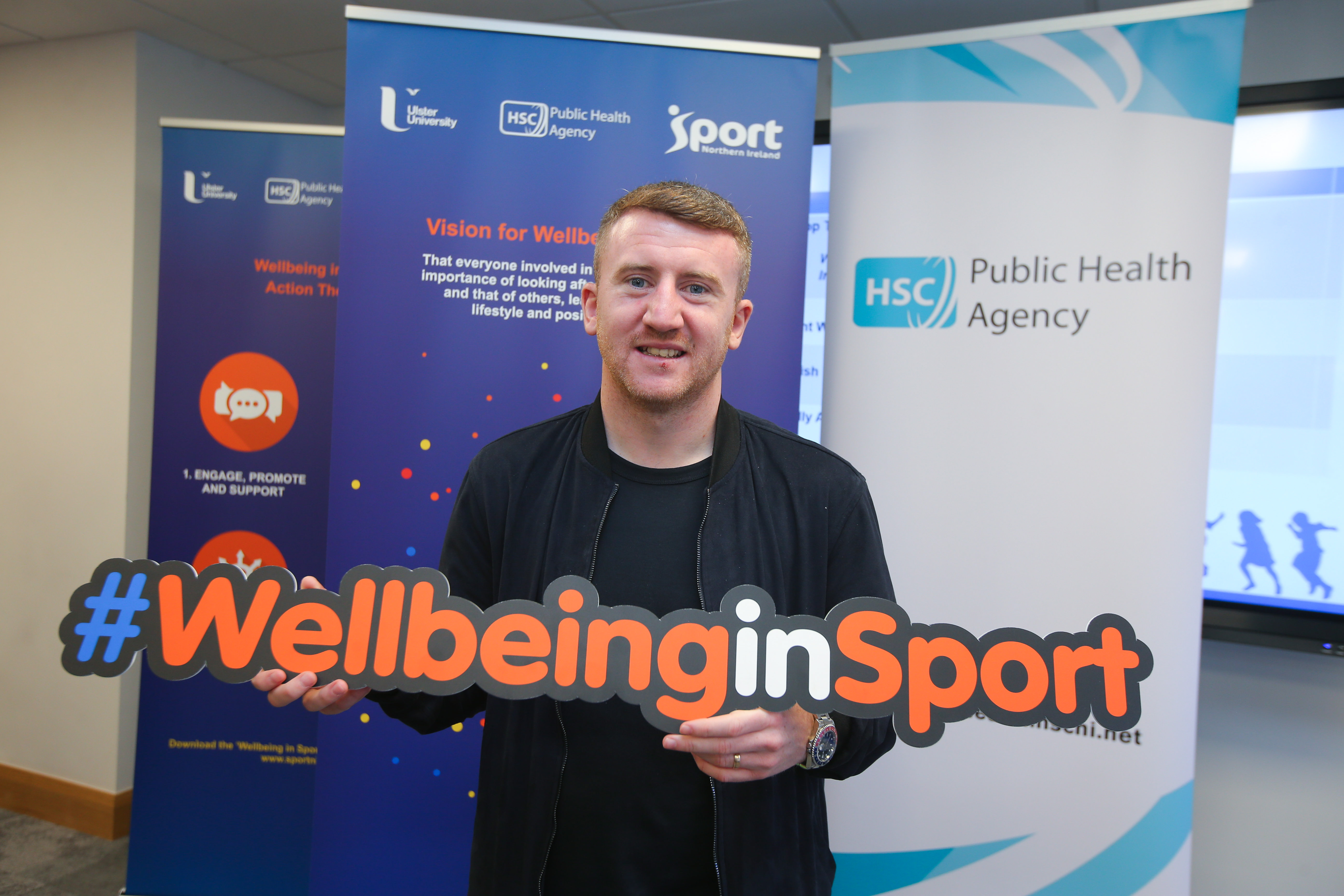By Dr Gavin Breslin @breslin_g and Dr Paul Donnelly
Positive engagement with sport is associated with an array of physical, emotional and psychosocial health benefits (Breslin et al, 2017). Emerging evidence suggests that competitive sport, by nature, can also contribute to poor mental health, in particular when athletes experience insufficient support (Bauman 2016). There is a growing number of attempts to create a culture that promotes and protects wellbeing (Breslin et al 2017). Sporting organisations along with government have shown an increased commitment to better support athletes. Research in the area is also on the rise.
This article summarises actions taken around the world to support athlete’s wellbeing in sport and the four steps we used to develop a research-informed Wellbeing in Sport Action Plan 2018-2023 for Northern Ireland. It is our intention that the lessons learned in designing and implementing these steps may support others to develop their national action plans.
Institutes supporting athletes’ wellbeing
College athletic departments in the USA, the USA Olympic Committee, and professional sport organisations now provide athletes, coaches and support staff with access to mental health professionals. Furthermore, the National Association of Athletic Trainers published a consensus statement addressing the growing concern of mental health issues among athletes, while the National Collegiate Athletic Association (NCAA, 2014) has identified the need for college athletic departments to provide mental health guidelines for athletes. In Australia, counselling support and mental health awareness programmes are available to elite athletes (Australian Sports Commission, 2016).
The European Federation of Sport Psychology (FEPSAC) developed a position statement on the mental health of elite athletes and described varied models of mental health service provision across six countries including parts of the United Kingdom(eg, Great Britain and Northern Ireland, France, Germany, Hungary, Italy and Sweden)(Moesch, Kentta, Kleinert, Quignon-Fleuret, Cecil & Bertollo, 2018).
In 2015, the UK Government launched a mental health in sport initiative whereby sport associations pledged to support to eliminate mental health stigma, narrow-mindedness and prejudice within their sport. Also in 2015 the Sport and Recreation Alliance launched the Mental Health Charter for Sport and Recreation designed to encourage sportspeople to be open about mental health issues in general. Finally, in March 2018, the UK government launched the Mental Health Action Plan for Elite Sport a plan developed at the same time as that for Northern Ireland. Taken collectively, the above actions at a government and association level are commended, however, the impact of these endeavours is still to be realised, and many other countries across the globe are yet to follow suit.
Developing the Northern Island 2018-2023 Wellbeing in Sport National Action Plan
Step 1: Establish a Mental Health and Wellbeing in Sport Steering Group
In January 2016, Sport Northern Ireland (SNI), the leading public body for the development of sport in Northern Ireland, formed a Mental Health and Wellbeing Strategy Steering Group (SG). An independent Chairperson was appointed.
The SG membership was deliberately broad. Members included policy makers, government department representatives, researchers, mental health charity workers, psychiatrists, psychologists, coaches, welfare officers, athletes and representatives of governing bodies of sport. Terms of reference for the committee were agreed upon and all members decided that it was vital to consider the current state of play in the field internationally and locally, and given this, a systematic review and national review of the evidence was commissioned to help inform any future decisions by the SG on a workable action plan. A smaller forum consisting of policy makers, researchers, coaches and welfare officers took the actions forward from the SG.
Step 2: Research informed practice
The SG oversaw the commissioning of the research and reports. The first report was a systematic review of interventions in sport designed to promote mental health and wellbeing (Breslin, et al, 2017), and the second was a regional review of existing local mental health awareness programmes (Breslin, et al, 2016).
The systematic review of existing mental health programmes revealed that there were few well designed research studies to draw upon internationally, and for those that were available, a degree of caution was advised in implementing similar programmes given the absence of robust monitoring or evaluation data.
A regional review was next undertaken and this consisted of interviews and focus groups with members of the SG, coaches and sport associations. Questions on the requirements to support the mental health of those involved in sport were asked. A thematic analysis of the data highlighted a need for leadership and interagency approaches to support athletes. It was apparent that 15+ mental health awareness programmes that targeted sports clubs were being delivered across Northern Ireland with few being tailored to sport or having an evidence base.
After consideration of the two reviews, it was evident that any interventions should be evidence-based, tailored to the sport environment, and the culture of athlete performance. The SG recommended to consult the sporting public across Northern Ireland to identify if they felt there was a need for a mental health or wellbeing action plan for sport, and if yes, what it should include.
Step 3: Public consultation
Public consultation events were held 3rdApril -10thMay 2017 across Northern Ireland. Attendees represented governing bodies of sport, local sport clubs, community groups, the voluntary sector, charities, political parties and other individuals interested or working in sport. Another thematic analysis was performed on the emerging qualitative data.
The consultations informed four recommendations for the SG:
- There is an urgent need for leadership and an Action Plan for those involved in sport and that this must extend beyond elite athletes;
- The Action Plan needs to be adequately resourced and must complement existing mental health strategies in public health;
- Mental health and wellbeing awareness programmesand support should be made available with immediate effect, and;
- Each sports club should consider appointing a Mental Health and Wellbeing Officer to champion and support the promotion of relevant issues at a grassroots level.
The SG considered views from this report, along with evidence from Step 2. A draft of the Action Plan was produced; several drafts and meetings discussing the action plan then took place before the document was finalised and endorsed by all relevant parties across the sector.
Step 4: The Action Plan
The Wellbeing in Sport Action Plan for Northern Ireland, 2018-2023 (Sport Northern Ireland, 2018) was released in October on World Mental Health Day. Available here: https://www.communities-ni.gov.uk/publications/wellbeing-sport-action-plan-2018-2023
The Action Plan sets out a shared vision, ‘That everyone involved in sport is aware of the importance of looking after their mental health, and that of others, leading to a healthier lifestyle and positive wellbeing’.
The purpose of the Action Plan is to:
- Give direction to the development of mental health and wellbeing awareness in sport settings across Northern Ireland;
- Encourage strategic and joined-up working to have real impact;
- Agree where the sector would like to be by 2023 and to provide a guide for how to get there; and
- Provide a framework for strategic investment in mental health and wellbeing in sport.
Developing the National Action Plan took a considerable amount of time and effort but all those involved now duly recognise the importance of taking a measured approach to ensure that emerging actions are grounded in best practice and informed by contemporary research, rather than being a ‘knee jerk reaction’ to current trends or media headlines. Ensuring buy-in from all partners was critical along the way, and the entire endeavour has been characterised by a collaborative approach which should hopefully now carry through to full implementation over the next five years. Key partners have already committed both material and human resources to ensure that the plan translates to live actions. Indeed, the acid test of the action plan will be its impact on the ground, and so systematic monitoring and evaluation of its effect is an integral part of the plan.



***
Dr Gavin Breslin @breslin_g (Ulster University, Northern Ireland) is a Sport and Exercise Psychologist. He has published extensively in psychology as well as having worked with international team and individual athletes. His research has impacted mental health in sport policy in Northern Ireland, and he is currently leading on a consensus statement on mental health awareness in sport. He is author of two books entitled: Sport and Exercise Psychology, Practitioner Case studies (2016, Wiley), and Mental Health Interventions in Sport: Research, Theory and Practice (2019, Routledge). Email g.breslin1@ulster.ac.uk
Dr Paul Donnelly is the Regeneration Director of Antrim GAA and former Policy, Planning and Research Manager of Sport Northern Ireland (email paul.donnelly.rm.antrim@gaa.ie).
Competing interests
None declared
References
Bauman, N. J. (2016). The stigma of mental health in athletes: Are mental toughness and mental health seen as contradictory in elite sport? British Journal of Sports Medicine, 50(3), 135-136. doi:10.1136/bjsports-2015-095570 [doi]
Breslin, G, Shannon, S, Haughey, T, Donnolly, P and Leavey, G (2017). A systematic review of interventions to increase awareness of mental health and well-being in athletes, coaches and officials. Systematic Reviews, 6(177), 1-15.
Breslin, G, Shannon, S, Haughey, T, Donnolly, P and Leavey, G (2017). A Review of Mental Health and Wellbeing Awareness Programmes in Sport. Sport Northern Ireland. Belfast.
Moesch, K. Kenttä, G., Kleinert, J., Quignon-Fleuret, C., Cecil, S., Bertollo, M. (2018). FEPSAC position statement: Mental health disorders in elite athletes and models of service provision. Psychology of Sport and Exercise, 38,61-71.
National Collegiate Athletic Association (2014). An Introduction to Mind, Body, and Sport—Understanding and Supporting Student-Athlete Mental Wellness (http://www.ncaapublications.com/)
Sport Northern Ireland (2018). Wellbeing in Sport Action Plan 2018-2023. https://www.communities-ni.gov.uk/sites/default/files/publications/communities/wellbeing-in-sport-action-plan-2018-2023.pdfAccessed 26th October 2018.